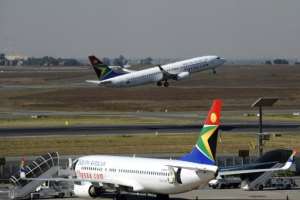
Cape Town (AFP) - South Africa's finance minister hiked taxes and targeted what he called wasteful and corrupt government spending on Wednesday in a "crisis" budget aimed at staving off a ratings downgrade to junk status.
Africa's most developed economy is struggling with shrinking growth, unemployment running at 25 percent, and widespread poverty.
"There is no doubt about the fact that we are in crisis," minister Pravin Gordhan told a media conference ahead of his budget speech.
Presenting the budget to parliament he announced greater cooperation with the private sector in an effort to boost growth, which he forecast would drop to below one percent this year.
Although he did not use the word "privatisation", the minister opened the way for private sector investment in under-performing state-owned enterprises.
These include the loss-making national carrier South African Airways, long a target of government critics.
Gordhan said the government would explore a merger of SAA with the state-owned SA Express airline "with a view to engaging with a potential minority equity partner."
Privatisation has long been resisted by sections of the ruling African National Congress.
Increased taxes on excise duties, capital gains, fuel, sugary drinks, alcohol and tobacco and environmental levies are expected to bring in an extra 18 billion rand ($1.18 billion).
Personal income tax was not increased, but "current taxes on wealth are under review", Gordhan said.
The government spending ceiling will be cut by 25 billion rand ($1.64 billion) over the next three years, mainly by trimming posts in the bloated public service.
Government corruption will be tackled through a crackdown on tender processes, while wasteful expenditure clamps will include a downgrade in the value of cars bought for politicians.
Abuses in the private sector will also be targeted.
"We will continue to act aggressively against the evasion of tax through transfer pricing abuses, misuse of tax treaties and illegal money flows", Gordhan said.
At the same time he said steps were being taken to cut red tape for business investors, including the establishment of Invest South Africa as a partnership with the private sector.
- 'Address declining confidence' -
Winning the confidence of the ratings agencies -- which help determine how much countries pay to borrow money -- was made more difficult when President Jacob Zuma shocked markets in December by firing two finance ministers within four days.
Gordhan, who was widely respected when he held the position from 2009 to 2014, was recalled in a panicked attempt to limit the damage to the country's credibility.
"In acting together we can address declining confidence and the retreat of capital, and we can combat emerging patterns of predatory behaviour and corruption," Gordhan said.
The minister faced the difficult balancing act of trying to please both the financial world and a government facing voters in municipal elections this year.
He denied in his press conference that he was presenting an "austerity budget", saying that spending cuts would be made without affecting social services.
South Africa is regularly rocked by protests over service delivery for the poor, and in the past year the unrest has spread to university campuses with students pressing for free education.
Gordhan announced an extra 16 billion rand ($1.05 billion) for higher education, saying "we are crafting solutions to the voices of students regarding fees and housing".
A central objective of the budget was to stabilise debt as a percentage of GDP, he said.
"Net national debt is projected to stabilise at 46.2 percent of GDP in 2017/18, and to decline after that."
Efforts are also being made to reign in the budget deficit, which is expected to be 3.2 percent of GDP this year on total spending of 1,324 billion rand ($86.9 billion), declining to 2.4 percent in 2018/19.
Apart from policy missteps, the resource-rich economy has been hard hit by falling commodity prices on reduced demand by China, and an agricultural sector hobbled by the worst drought in more than a century.




 Akufo-Addo did not order Overlord of Gonjaland to rise and greet him- Richard Ah...
Akufo-Addo did not order Overlord of Gonjaland to rise and greet him- Richard Ah...
 Many girls sleep with dogs for money — Mona Gucci
Many girls sleep with dogs for money — Mona Gucci
 Ejisu by-election: No election is small, easy but NPP will win — Frimpong Kodua
Ejisu by-election: No election is small, easy but NPP will win — Frimpong Kodua
 No president can take credit for constructing a road in Ghana; they’re taxpayers...
No president can take credit for constructing a road in Ghana; they’re taxpayers...
 Prof. Jane Naana has shaken Ghana's political foundation, causing NPP to run hel...
Prof. Jane Naana has shaken Ghana's political foundation, causing NPP to run hel...
 I've been receiving threats after I commended NPP for completing school projects...
I've been receiving threats after I commended NPP for completing school projects...
 Bawumia is ready to debate Mahama any day – Frederick Opare-Ansah
Bawumia is ready to debate Mahama any day – Frederick Opare-Ansah
 Register births at CHPS compounds; don't come to Accra – Birth & Death Registrar...
Register births at CHPS compounds; don't come to Accra – Birth & Death Registrar...
 We never said only 10 BVDs were auctioned – EC replies IMANI
We never said only 10 BVDs were auctioned – EC replies IMANI
 Election 2024: Akufo-Addo willing to trample on Ghana’s constitution – Mahama
Election 2024: Akufo-Addo willing to trample on Ghana’s constitution – Mahama
